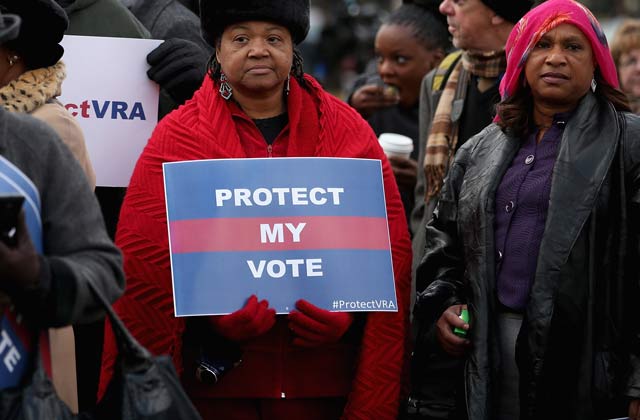Most of what I read about Snowden makes me think that no one knows what’s really going on. Or, phrased differently, the folks who do know what’s going on aren’t talking. Still, here are two interesting theories that I thought were interesting enough to share.
Politics
Reconciliation and the Eternal Race War
Right now everyone’s talking about the SCOTUS decisiosn overturning DOMA and (effectively) Prop 8, which is understandable, but I don’t like talking about what everyone else is talking about so I’m going to talk about the decision that was making headlines before the gay-marriage decisions: the gutting of the Voting Rights Act.
For those not paying attention, the Court (by a 5-4 margin, again) struck down the provision of the VRA that required certain states (mostly in the South) to run any proposed changes to voting by the Department of Justice for review first. Of course there is the usual liberal willful blindness on this one. Rather than see that Southern states chafe under federal intervention (just as Western states are annoyed by how much of their land is owned by the Feds), they see nefarious schemes for intentional racist oppression. The worst of which, as far as I can tell, comes down to requiring photo IDs, which is something that developed democracies in Europe require as a matter of course (this Foreign Policy mag referred to the US system as “trust based”).
Texas Abortion Law Stalled
The Texas Tribune is reporting that the GOP attempt to pass one of the nation’s strictest abortion laws in Texas failed last night / early this morning because the Republicans were unable to vote before midnight. The whole thing makes me so depressed.
- I give props to Wendy Smith for her legitimate, stand-up-and-talk-for-hours filibuster. I’m not an expert, but the GOP’s efforts to derail her seemed shady at best.
- I can’t give props for her reasoning. She said the defeat of the bill “shows the determination and spirit of Texas women and people who care about Texas women.” This is a bill that included safeguards for women that are desperately needed (Gosnell wasn’t alone, and we know that). Defeating the bill isn’t about supporting women. It’s about supporting abortion.
- The mob take-over of the legislature was, given the GOP’s shady handling of the filibuster, perhaps a necessary evil. But the raucous celebration of the chaos by Democrats is immature at best, and strikes me as ominous. If the majority of people have to seize power from their elected officials, even for a moment, that’s a serious and sober moment. But when a minority do so it is even more troubling. Even if you oppose the law, there’s nothing to celebrate at all in how it was defeated.
It depresses me and it shames me as an American. There may have been some few folks who acted out of principle, but all I see–on both sides–is a rowdy crowd rioting because their team won or lost a sporting event.
Beyond Bigotry: The Real Opposition to Same-Sex Marriage
A lot of things are disconcerting about the same-sex marriage debate. One of them–which I’ve already discussed–is the way that social conservatives were silent for too long in pairing a principled stand for traditional marriage (one Christian virtue) with sincere interest in the welfare of homosexuals as brothers and sisters (an even more important Christian virtue). But another comes from the opposite side of the political spectrum.
Eric Teetsel explains it harshly but clearly in a post for the Witherspoon Institute:
Sherif Girgis, Ryan Anderson, and Robert George recently wrote a masterful defense of what marriage is and why it matters. It is no exaggeration to say that their argument is the intellectual foundation for marriage advocates, used by the National Organization for Marriage, the Heritage Foundation, and others (including my own Manhattan Declaration).
What did the same-sex marriage movement do with this seminal book? They ignored it.
They don’t have answers to the authors’ claims; they don’t need them. Advocates of same-sex marriage aren’t concerned about the logic of their arguments or the precedents they establish. Forget facts; theirs is a more powerful weapon in the era of amusement: fad.
As I said: harsh. But I think Teetsel is largely right, even if it could have been expressed with more sensitivity. In almost all cases the “debate” goes something like this: support gay marriage or be tarred a bigot. With some exceptions that seems to be about it. It’s as though Americans who support gay marriage think that the Westboro Baptists genuinely represent the traditional marriage constituency.
They don’t.
With the upcoming Supreme Court decision, this debate may be winding down or moving on. Then again, maybe not. But in either case, I think it would be incredibly beneficial for those who support marriage equality to read the paper Teetsel referenced. It’s called “What Is Marriage?” and it appeared in the Harvard Journal of Law and Public Policy. It’s not exactly short or light reading, but as Teetsel points out, it’s the actual expression of what defenders of traditional marriage actually believe. No matter how this debate plays out, I think that’s something worth understanding. Primarily, I might add, because I think while it may not be what gay marriage supporters want to hear (obviously), it’s notably free of what bigotry, animosity, or intolerance as a motivation. Vocal minority of fearful idiots notwithstanding, that’s not what the traditional marriage movement is really about.
So go ahead: give it a read.
Monday Morning Mormon Madness: Modesty and Feminism.
Check that alliteration out! That’s a 5 in a row and 5 out of 7. Don’t try this at home!
Anyway, here’s my weekly post for Times And Seasons, in which I jump into the fracas over (former Power Ranger, current swimwear designer) Jessica Rey and her comments about bikinis, modesty, and empowerment.
This one is definitely less heavy on the Mormon terminology and more universal in scope, although it does address more the concerns of religious (not necessarily Mormon) social liberals and social conservatives. I’m going to turn comments off on this thread, so feel free to weigh in over there if you’d like.
Obama Admin Accounts for 70% of Espionage Act Indictments

So the Obama Administration has filed a criminal complaint against Edward Snowden, and some of the counts fall under the Espionage Act of 1917. According to the WaPo’s article:
There was never any doubt that the Justice Department would seek to prosecute Snowden for one of the most significant national security leaks in the country’s history. The Obama administration has shown a particular propensity to go after leakers and has launched more investigations than any previous administration. This White House is responsible for bringing six of the nine total indictments ever brought under the 1917 Espionage Act. Snowden will be the seventh individual when he is formally indicted.
I find it interesting that an espionage law that is almost 100 years old will end up having 70% of its indictments come from the current administration. That’s just a really stark example of the “particular propensity to go after leakers” the article mentions. I also think that having Snowden successfully extradited might be the worst thing that could happen to the Obama administration politically, but I guess we may have a chance to find out soon. (Also, the complaint against Snowden was initially sealed. Figures.)
If You Really Care: Take Risks but Speak Carefully
When it comes to politics, ignorance really is bliss. I didn’t really know very much at all about politics until I felt obligated by civic duty to start paying attention around 2006. One of the things that I chose to do was expose myself to different voices, so I started listening to conservative radio (starting with Rush Limbaugh) as well as looking for liberal radio (which was harder to find, but I found some). It definitely degraded the happiness level of my life, but I learned a lot. I learned, for example, that the mainstream media frequently misquotes Rush Limbaugh and that, for his part, Rush Limbaugh frequently says misquotable things. It’s a co-dependency: each relying on the perceived injustice of the other to rally their own side (and drive advertising dollars, of course).

I also learned that when Rush Limbaugh has to pick between his principles and his ratings, he picks his ratings every time. The most vivid demonstration of this comes every four years during the GOP primary
Exodus Closure Shows Progress in Social Conservatism
 Although I am a social conservative, I believe that social liberals have played and continue to play a vital and important role in challenging the reasons for socially conservative positions. Quite frequently the position you take is less important than the reason you have for holding that position, but this fact has often been lost to both sides of controversial political issues. I feel it acutely because I’m often annoyed or ashamed by the rhetoric or actions of people who are (technically) on the same side of issues as I am. For example, I am pro-life but I cannot abide those who aggressively promote the idea that abortion is equivalent to murder.
Although I am a social conservative, I believe that social liberals have played and continue to play a vital and important role in challenging the reasons for socially conservative positions. Quite frequently the position you take is less important than the reason you have for holding that position, but this fact has often been lost to both sides of controversial political issues. I feel it acutely because I’m often annoyed or ashamed by the rhetoric or actions of people who are (technically) on the same side of issues as I am. For example, I am pro-life but I cannot abide those who aggressively promote the idea that abortion is equivalent to murder.
I am also deeply skeptical of the arguments for same-sex marriage, but I cannot contest that the argument over the issue has exposed deep, ugly, and un-Christian attitudes within the community of social conservatives. Much of the reaction against the gay rights movement has been born out of fear, pure and simple. I heard once as a kid that there are ultimately only two human motivations: fear and love. Either we act for something we desire, or we react against something we fear. There’s room for caution and prudence in this paradigm, but fear is almost invariably a symptom that something is wrong. In acting out of fear, social conservatives have been too slow to denounce indefensible treatment of homosexuals or–in the worst cases–have even employed bigotry as a political weapon. They have failed to live up to the example and teachings of Christ and, in the long run, nothing has done more to damage their cause then this alliance with hatred.
And so I’m extremely impressed with what I have read coming from Exodus International today.
Michael Hastings’ Last Report
BuzzFeed’s Ben Smith has a moving remembrance of BuzzFeed reporter Michael Hastings, who died at 33 in an unusual car accident two days ago. Hastings’ last report for Buzzfeed was published about a week and a half before his death with the headline Why Democrats Love to Spy on Americans. Given the provocative title and tone (e.g. “Unsurprisingly, the White House has dug in, calling their North Korea-esque tools “essential” to stop terrorism…”) and the surprising nature of his death, it’s not hard to see why conspiracy theories are already popping up, just as they did in the wake of Andrew Breitbart’s untimely passing.
When you look at those two examples, it’s not hard to see why some people develop a real paranoia, but it helps your sanity to put it in context. This past week has seen the deaths of Ian M. Banks, James Gandolfini, and Vince Flynn, all at relatively young ages. All of those folks are famous to some degree or other, and all of them meant something to me. In other words: death happens.
So I’m not going to contribute to the conspiracy-mongering, but I do think Hastings’ last article is worth reading on it’s own merits. He did a good job exploding the myth of Democratic superiority on civil liberties issues, and his voice would have been invaluable in the coming years.
The Dangers of Puritanism in the Pro-Life Movement
Although I am strongly pro-life, I don’t follow the movement closely, so I’ve been puzzled by a barrage of emails, Tweets and Facebook posts that I’ve been paying semi-attention to over the past week about an internal furor over HR 1797: The Pain-Capable Unborn Child Protection Act. According to the executive summary of the bill:
H.R. 1797 generally prohibits the abortion of unborn children at twenty weeks after fertilization or later, the stage during which a substantial body of medical evidence indicates that they are capable of feeling pain. The bill provides exceptions for pregnancies resulting from rape, or from incest against a minor, as long as such incidents are reported to the appropriate law enforcement or government agency prior to the abortion. H.R. 1797 also provides an exception when the life of the mother is in danger. The termination of a pregnancy under the exceptions generally must be done in manner that provides the best opportunity for the unborn child’s survival.
A person who performs or attempts to perform an abortion prohibited under H.R. 1797 will be fined, imprisoned for less than five years, or both. However, H.R. 1797 prohibits the prosecution of a woman who receives an abortion in violation of the bill.

This seems like a no-brainer pro-life position to me, so I couldn’t tell what all the fuss was about from inside the pro-life movement. Today, however, noted pro-life activist Rebecca Kiessling linked to an open letter by Dan Becker to the pro-life community. I read it, and discovered that the anger comes from a perceived schism within the pro-life movement.






